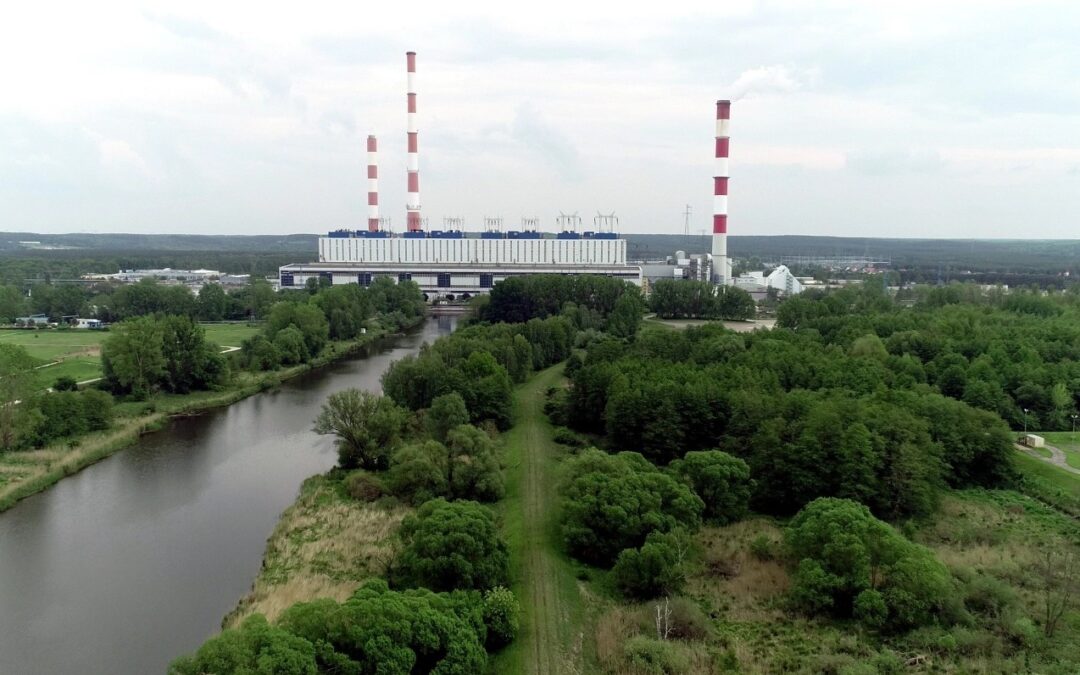Keep our news free from ads and paywalls by making a donation to support our work!

Notes from Poland is run by a small editorial team and is published by an independent, non-profit foundation that is funded through donations from our readers. We cannot do what we do without your support.
A subsidiary of state-owned PGE, Poland’s biggest power producer, has reached an agreement with trade unions on the closure of its Dolna Odra coal power plant, offering workers severance payments of up to 400,000 zloty (€94,450) each.
The shutdown of the facility, which has operated in northwest Poland since 1970, forms part of PGE’s plans to phase out coal assets and replace them with lower-emission gas. More broadly, Poland’s government is seeking to move away from coal and towards nuclear and renewables, as well as gas.
The deal with workers, worth 250 million zloty (€59 million) in total, was described by PGE as a “record-breaking support package” and “groundbreaking in the Polish energy sector”.
PGE GiEK zawarła porozumienie ze związkami zawodowymi Elektrowni Dolna Odra. Pracownicy otrzymają pakiet wsparcia, którego wartość ma wynieść około 250 mln zł. Do ich dyspozycji będą także doradcy zawodowi i eksperci do spraw rynku pracy.https://t.co/7xSYN29bp5 pic.twitter.com/ZuYZ9pt3QQ
— TVP3 Szczecin (@tvp3szczecin) October 24, 2025
The Dolna Odra Power Plant has four coal-fired units of 225 MW each. PGE said output at the facility has fallen sharply in recent years and is expected to drop by about 60% next year compared with 2024, leaving the units permanently unprofitable due to high maintenance costs.
The plant was originally set to close at the end of 2025, but PGE extended the operation of two units until August 2026 to ensure energy security and give workers more time to plan their futures.
Under the settlement, employees will receive compensation of up to 30 times their average monthly salary, which could amount to up to 400,000 zloty for some workers.
Those wishing to continue working will be given priority for positions elsewhere within the PGE Group, while others can take voluntary redundancy. Staff within four years of retirement will be eligible for paid leave on 80% of their salary.
PGE’s CEO, Dariusz Marzec, said the deal “demonstrates that the energy transformation at PGE is being carried out with respect for people, their work, and local communities”.
“Together, we have developed a solution that provides real support to employees while simultaneously shifting the trajectory of the Polish energy sector towards modern, economically efficient, and low-emission energy sources,” he said in a company statement.
Union leader Mariusz Kamiński said the agreement, negotiated over several months, “is a guarantee that no one will be left alone” in the energy transition.
Coal remains Poland’s dominant energy source. Last year, it accounted for nearly 57% of the country’s electricity generation. However, that figure has been falling, in April this year, the monthly share of coal in Poland’s energy mix fell below 50% for the first time on record.
Coal produced less than half of Poland's power for the first time ever last month.
Meanwhile, the share of renewables rose to 34.2%, as Poland slowly moves away from fossil fuels.
For more, read our full report: https://t.co/WXyxQe0gQ7 pic.twitter.com/Fav6BfN8LF
— Notes from Poland 🇵🇱 (@notesfrompoland) May 13, 2025
Polish coal is among the most expensive to mine globally, and the EU’s Emissions Trading System has made coal-fired power even more uncompetitive against gas and renewables.
At the same time, miners and other workers in the sector have powerful and influential unions, which oppose any moves to quickly move away from coal. They emphasise the need for a “just transition” that protects workers and regions long associated with coal.
This year, Poland is expected to pay up to 9 billion zloty to the mining industry to sustain the sector. Following public criticism, the amount of support for next year was put at 5.5 billion zloty in the draft budget bill.
Polish coal is costly and polluting. But its powerful symbolism has kept the country and its politicians hooked on the "black gold".@AlicjaPtak4 explores coal’s past, present and future in Poland https://t.co/E6IhQ64aGC
— Notes from Poland 🇵🇱 (@notesfrompoland) August 14, 2025
To replace lost coal capacity, PGE has invested in gas generation in the region. Two 1,366 MW gas-steam units went online in 2024, supplying electricity for around 5% of Polish households.
A tender is also underway for a new 600 MW gas-fired unit at the Gryfino-Dolna Odra site, while construction of a heating plant in Gryfino is due for completion in late 2026.
PGE also plans a 400 MW battery energy storage facility in Gryfino, with 800 MWh of capacity. Earlier this year, it began work on what it says will be Poland’s largest energy storage installation in Żarnowiec, northern Poland.
Poland has begun construction of its largest energy storage facility, and one of the biggest of its kind in Europe.
It is intended to become a key part of the transition towards greener forms of energy, storing surplus power produced by renewables https://t.co/fH63Y1LlNZ
— Notes from Poland 🇵🇱 (@notesfrompoland) September 23, 2025

Notes from Poland is run by a small editorial team and published by an independent, non-profit foundation that is funded through donations from our readers. We cannot do what we do without your support.
Main image credit: PGE/press materials

Alicja Ptak is deputy editor-in-chief of Notes from Poland and a multimedia journalist. She has written for Clean Energy Wire and The Times, and she hosts her own podcast, The Warsaw Wire, on Poland’s economy and energy sector. She previously worked for Reuters.




















